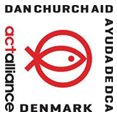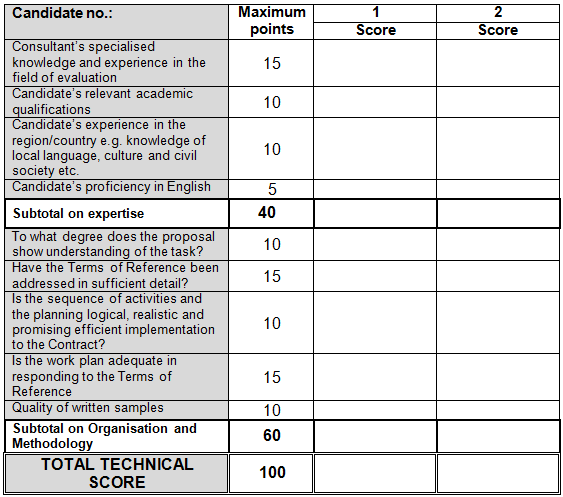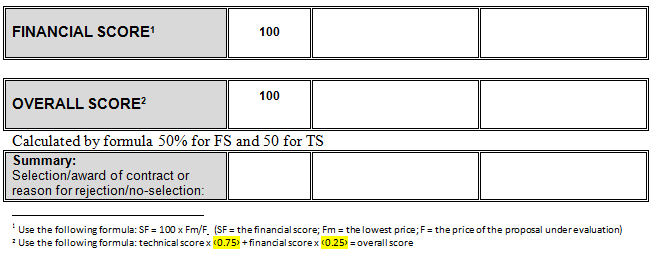TOR EXTERNAL MIDTERM EVALUATION TEAM

TERMS OF REFERENCE
EXTERNAL MIDTERM EVALUATION TEAM
BACKGROUND INFORMATION
DanChurchAid is an independent, faith-based non-missionary humanitarian and development non-governmental organization (NGO) with headquarter based in Copenhagen, Denmark.
DanChurchAid is rooted in the Danish National Evangelical Lutheran Church, but is active wherever we find the need is highest, regardless of religion, gender, political beliefs, race, and national or ethnic origins, handicaps or sexual orientation. Our work is based on a Christian view of humanity with respect for every individual’s rights and equal worth. DanChurchAid carries out its work within the objective: "To help and be advocates of oppressed, neglected and marginalized groups in poor countries and to strengthen their possibilities of a life in dignity”. DanChurchAid’s aim is to strengthen the world’s poorest people in their struggle for a life in dignity.
We cooperate with numerous local partners, other national and church organisations as well as international networks. We are a part of the ACT Alliance (Action by Churches Together) – an alliance that consists of more than 100 churches and humanitarian organisations across the world. Together, we make up one of the world’s five largest NGOs. The ACT Alliance works with development, humanitarian assistance and advocacy in more than 120 countries.
DanChurchAid is an independent organisation. Our work is financed via fundraising campaigns, contributions from individuals, companies and funds from the Danish government (Danida), the UN, EU and other bilateral donors. The organisation has a long-term framework agreement with Danida, a framework partnership agreement with the Humanitarian Aid Office (ECHO) of the European Commission, and has implemented numerous contracts with the EuropeAid Co-operation Office and several UN agencies.
DCA always works through local partner organizations. For this intervention, DCA is working with a long-standing Palestinian partner in the West Bank, YMCA, (with which DCA in December 2013 signed a partnership agreement); and two other organisations, BADIL and B’Tselem, to implement the operation A Multi-Sectoral WATSAN/PROTECTION/Advocacy Action in Area C in the West Bank benefitting the most vulnerable rights holders and targeting duty bearers - Phase II project. The main aim of the operation is to protect, assist and advocate for the most vulnerable segments of the Area C population in the oPt affected by the Israeli occupation. The operation is funded by the European Commission Directorate General for Humanitarian Aid and Civil Protection (ECHO). This is the 4th round of ECHO DG support to similar DCA and partners actions in the targeted areas and the current project phase runs from 1st July 2013 to 31st December 2014. The last six months of the project period is a cost extension with slight changes at activity and partner interventions.
The project, although integrated, has three distinct target populations that reflect the three overall intervention areas:
1-Rights holders in Area C in general for protection issues with focus on Bedouin communities for WASH activities in Eastern slopes of Bethlehem: The Bedouin communities targeted in this project are located in remote areas in the West Bank. The only income source for the Bedouins is the products they produce from their herds and from breeding. Many Bedouin families have no access to the services of the Ministry of Agriculture (MoA), nor are they connected to the Palestinian Water Authority (PWA) water network.
2-The targeted Bedouin communities in the West Bank have no connections to water lines and the communities currently rely on water brought in by tankers. Therefore rain water represents an important source of water for the communities.
3-Duty bearers/stakeholders inside and outside the OPT (Israeli and international duty bearers; leaders of NGOs and INGOs; opinion formers in Israel, Europe and US)
4-Youth, academic students and leaders, CBO and popular committee members, refugees, local activists, civil society leaders and individuals endangered from forced displacement.
This Terms of Reference describes the project in brief and the requirements for an evaluation of this project by external evaluator.
OBJECTIVES AND EXPECTED RESULTS
Objectives:
To provide an external midterm evaluation ofthe herein defined project (hereafter: Operation) as according to OECD – DAC criteria for the evaluation of humanitarian action
Results to be achieved by the consultant:
-Produce a final overall mid-term evaluation of the above referenced Operation that includes an assessment the quality and location of ancient water cisterns that have been rehabilitated, new household cisterns that have been constructed as well as the protection and advocacy activities and the overall project approach and management in terms of participation of beneficiaries, selection criteria and results
SCOPE OF THE SERVICES
The purpose of the evaluation is to obtain an objective, critical, readable, and transparent analysis of the progress made with the intervention. The analysis should contain recommendations on future courses of action. The evaluation should be a document that can function as a learning tool for the project donor and the implementing agency, partner organizations, local communities and other relevant stakeholders.
For the purpose of accomplishing his/her tasks, the evaluator will consider the following methodology:
An initial briefing and final debriefing between the evaluator and the DCA Programme Staff.
Review of the main reference documents (including but not limited to):
-Project proposal, midterm report submitted to the donor, financial reports, monitoring visits used by the programme staff.
-Strategic Framework and Lessons Learnt following the water scarcity response 2012
-Review of other relevant documents from other institutions working in the same field and target areas.
-DCA needs Assessment 2012
-Local2Globaldraft research findings
-Partners reports and documents (shared with the selected evaluation team)
-ECHO Humanitarian Implementation Plans for Palestine for 2013 and 2014
-Humanitarian Accountability Partnership (HAP) principles
-Baseline Survey 2014 commissioned by the Operation
-Relevant protection related studies, information products and training material.
The Evaluator/ evaluation team is expected to collect an appropriate range of data. This includes (but is not limited to):
Direct information: Interviews with beneficiaries, visit to project sites and focus group discussion with beneficiaries and questionnaires. Interviews with key staff members
Indirect information: Interviews with local representatives; interviews with project staff (expatriate and national); meetings with local authorities, donor representatives. For indirect data collection, standard and participatory evaluation methods are expected to be used (HH interviews, non-beneficiaries, key informants (health workers and teachers)
Secondary information analysis: including analysis of WASH/ Protection Clusters data and/or any other relevant statistical data such as Badil Online Hub.
-A main part of the evaluation will consist of a field visit of 5 days to areas of the operation implementation. Semi-structured interviews and focus group discussions with project beneficiaries, EJ YMCA, Badil and BT’Selem, staff members, contractors (if possible) and other relevant stakeholders will take place and be arranged by DCA and local partners in consultation with the evaluator. The evaluator should look at the physical constructions built, document the constructions by photos and comment on the quality and integrity of the structures
-The information collected by the evaluator should be related to the project objectives, expected results and indicators.
-A discussion of the evaluation methodology shall take place before starting the work.
-An analysis and assessment of targeting, accountability, gender, participation and selection criteria is a key part of this document
The main objectives of the mission are:
-To assess the appropriateness of the project actions with respect to the humanitarian needs and protection threats in the project area.
-To evaluate the performance and achievements of the project against the plans laid out in the approved project document and determine the degree to which each of the individual objectives of the project were achieved and what humanitarian impact these achievements had.
-To extract the lessons that can be learned from the project, provide recommendation for further engagements.
-Asses the project’s relevance, effectiveness, efficiency, and sustainability including maintenance issues and priorities for physical structures.
-Determine what lasting impact the project may have achieved.
-Assessment on outcomes related to water consumption after the introduction of two water sources (sources for human consumption and sources for animal consumption) among the beneficiaries
-To provide recommendation on how to mainstream protection into our project interventions for instance using findings from key protection documents.
The OECD – DAC Criteria for the evaluation of humanitarian action will be used for the evaluation, together with relevant Sphere standards (including Standards Common to all Sectors) and other relevant technical standards, to be finalized during the planning of the evaluation.
Specific Evaluation Questions
1-To which extend does the project live up to the humanitarian accountability principles, in particular in relation to the Humanitarian Accountability Partnership’s Benchmark 3 (Sharing information), Benchmark 4 (Participation) and Benchmark 5 (Handling complaints)? See the “2010 HAP Standard in Accountability and Quality Management” for more information.
2-To which extent is the project rights-based?
Participation: Have rights-holders participated in project design, implementation and this evaluation?
Accountability: Has the project made its commitments clear to the rights-holders, e.g. by disseminating budgets?
Non-discrimination: Has the project taken specific steps to include vulnerable groups?
Empowerment: Has the project made the rights-holders more capable of claiming their rights?
Linking: Are the specific local and global human rights mechanisms relevant to the project identified?
3-Has the Operation contribute to achieving the DCA Palestine Country Programme 2011-2014 objectives?
a-Significantly contributed
b-Contributed
c-Contributed only somewhat
What are some specific changes that have happened contributing to this?
4-Does the project fulfil OECD DAC’s criteria?
Relevance
-Is the activity relevant in relation to the needs and priorities of the intended rights-holders?
Effectiveness
-Have the primary objectives identified been achieved?
-Have the planned or expected results been achieved, including whether the intended population was reached?
Efficiency
-How economically have resources/inputs (funds, expertise, time, etc.) been converted to results?
-Are the investment and recurrent costs justified?
-Could the same results have been achieved with fewer resources?
Impact
-What positive and negative, primary and secondary long-term effects have been produced by a development intervention, directly or indirectly, intended or unintended?
Sustainability
-What is the probability of long-term benefits?
-Will the intended benefits continue when development cooperation is terminated?
-Is local ownership established?
5-Does the project follow the current DCA policy in the area?
TIMING, LOGISITICS AND FACILITIES
The evaluation will be for17 days starting 15th of August 2014 or as soon as possible thereafter with the following draft work plan:
Day 1-2: Preparation in home country. (2 days)
Day 3: Travel to oPt.
Day 4: Briefing and planning with team and partners.
Day5-9: Field visit and meetings. (5 days)
Day 10: Report writing – main findings.
Day 11: Debriefing with team and partners
Day 12: Travel back.
Day 13-15: Report writing and submission of first draft report (3 days)
Day 16-17: Revision of first draft report and submission of final report (3 days).
DCA MENA office will provide:
-The evaluator/ team leader with background information about the project and any available related document to assist the evaluator in undertaking the evaluation
-Facilitation of access/coordination with the project partner to ensure the evaluator will have needed cooperation to fulfill his mission successfully
-The full project proposal (and all accompanying documents) including the interim report
-All relevant project records, including correspondence, monitoring and evaluation forms, project notes and minutes, needs assessments, baseline data surveys if available, etc.
The evaluator will provide:
-An overall final evaluation report submitted in English covering the Expected Results and Scope of Evaluation mentioned in this Terms of Reference.
-Highlight critical issues, which may be of interest to the DCA NENA office.
-Identify challenges and lessons learned.
-Provide recommendations for further projects/ intervention.
-Identify main protection issues.
-Explore strategies or other relevant documents from other institutions working in the same field and target areas through a meeting with key oPt WASH sector partners.
-Recommendations for DCA and project partners to build on their strengths and achievements to overcome their challenges, identifying any continuing gaps or challenges that have not been addressed.
REPORTING
The evaluation report should be submitted following the style 1-3-25 as per the DCA evaluation policy:
http://www.danchurchaid.org/about-us/quality-assurance/monitoring-and-evaluation/downloads
QUALIFICATION REQUIREMENTS
The external evaluator or an evaluation team of max. 2 persons should have the following qualifications at a minimum:
-The Evaluator/Evaluation team should affirm that they understand the precise nature of the final deliverable (the Evaluation Report itself) and must provide two (2) recent work/writing samples. These work/writing samples will be carefully evaluated as a part of the candidate selection process.
-MA degree highly desirable with specific knowledge of multisectoral humanitarian aid approaches. The ideal consultant should have at least5 to 7 years of relevant experience in WASH and/or livelihoods, protection and advocacy from a relief and development agency.
-Relevant geographical experience from the Middle East, ideally including previous working with Bedouin populations. (Desirable)
-Knowledge in social mobilization methods (local committees) and knowledge of the cluster systems in humanitarian interventions,
-Significant field experience in the evaluation of humanitarian/development projects,
-Knowledge and experience of chronic and/or protracted disaster and sustainable solutions,
-Noticeable experience in undertaking similar project evaluations. including in evaluating ECHO funded actions,
-Knowledge of gender issues & deficits within women rights facing Palestinian women,
-Excellent verbal/written communication skills & strong report writing skills,
-Experience in demonstrating achievement of project indicators in a LFA approach,
-Fluent English language writing ability, and
-Ability to work with a team and under pressure meeting deadlines and producing agreed upon deliverables.
TERMS OF PAYMENT
The evaluation including logistical arrangements will be managed by the DCA country office in coordination with the evaluator.
DCA shall cover all expenses related to the assignment (flights, local transport, hotel accommodation, insurance etc.). Costs will be reimbursed based on submitted invoices.
The payments shall be made according to the following schedule:
-50% after signing the contract agreement
-50% after submission of final report
Payments will be processed within 30 days of the approval of the final evaluation report date.
Duties and Taxes
The consultants shall pay all duties and taxes levied by the (home country) at any stage during the execution of the work.
“However, if specified in the local law of the beneficiary country that it is the contracting authority responsibility to acquire tax receipts and deduction at source proofs from the contractor for the acquired service, the contracting authority shall do so. Otherwise contracting authority shall act upon the local law”.
Application Process and Timeline:
If you are interested in applying for this Consultancy, please send your resume, cover letter and a detailed technical proposal that includes the proposed methodology and a global financial offer indicating the daily fee rates and specifying other costs to:
and kindly include “ECHO External Midterm evaluation” in the subject line. Please indicate your daily fees rate in the cover letter, and indicate your starting date for the proposed for the consultancy.
The aim is for the consultancy to begin the field work in Palestine on 28thof August 2014.
Deadline for submission of offer is 1st August 2014. DCA expects to inform bidders on 5thAugust 2014.
Evaluation
All received proposals will be evaluated against the Evaluation Grid below:


Additional References or Resources
Resources particularly relevant to the project in question:
For general background on evaluation, DCA recommends the following documents. If links are broken, please report to the programme and policy unit.
General guidelines
Patton, M.Q., 1997, Utilization-focused evaluation, 3rd edition. Sage Publications, Thousand Oaks, Calif.
Patton, M. Q. 2006, Utilization-Focused Evaluation (U-Fe) Checklist
OECD/DAC 2010: The DAC Quality Standards for Development Evaluation
OECD/DAC 2010: Summary of Key Norms and Standards - Second Edition
ALNAP 2006: Evaluating humanitarian action using the OECD-DAC criteria - An ALNAP guide for humanitarian agencies
Spencer et al 2003: Framework for Assessing Qualitative Evaluations, Government Chief Social Researcher’s Office, London
World Bank 2011: Writing Terms of Reference for an Evaluation: A How-To Guide
World Bank 2004: Monitoring and Evaluation Tools, Methods and Approaches
Guidelines for reporting
TREND Statement: Transparent Reporting of Evaluations with Nonrandomized Designs (TREND)
Ethics of evaluators
Principles for Evaluators of the American Evaluation Association.
Standards
Humanitarian Accountability Partnership's Standards
SPHERE Standards
Randomized control trials
Duflo, E., Glennerster, R. and Kremer, M., 2007. Using randomization in development economics research: A toolkit. Handbook of Development Economics, 4, 3895-3962.

جميع الحقوق محفوظة لموقع جوبس.









